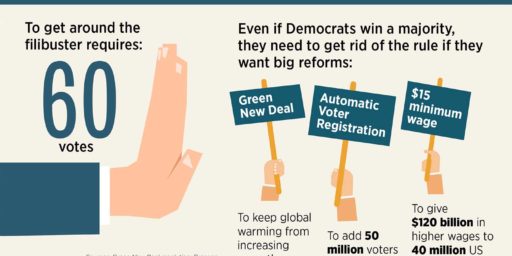Senate Republicans May Eliminate Filibuster For Supreme Court Nominees
For some reason, Republicans want to change filibuster rules even though it's unclear that they'll still hold the Senate after 2016.
Politico is reporting that Senate Republicans are considering taking moves made by the Democrats when they controlled the Senate even further and a abolishing the filibuster for Supreme Court nominees:
Top Senate Republicans are considering gutting the filibuster for Supreme Court nominees — a move that could yield big rewards for whichever party controls the White House and Senate after 2016.
The move, still in its early stages, reflects growing GOP confidence in its electoral prospects next year. But it could also have a major immediate impact if a justice such as 81-year-old Ruth Bader Ginsburg steps down, making it far easier for President Barack Obama to get a replacement confirmed.
The proposed change would expand on the dramatic move Democrats made in 2013, when they killed the 60-vote hurdle for executive branch nominations and almost all judicial nominees. Republicans have complained bitterly about the Democrats’ action ever since, saying it violated the Senate’s tradition of being a deliberative body where the minority holds big sway. But now, GOP supporters contend, it may be time to bring majority rule to votes on Supreme Court nominations, too.
The 60-vote filibuster threshold would remain for legislation.
The change is nowhere near a done deal: The proposal has not been widely circulated among Senate Republicans, and its backers say they would make the change only if they can get 67 votes for it on the floor. That means they would need broad support first among Republicans, then with more than a dozen Democratic supporters. Both parties would have to buy in — after pondering whether the shift would help them or hurt them.
But Sen. Lamar Alexander (R-Tenn.), who’s spearheading the proposal with Sen. Roy Blunt (R-Mo.), said the change would bring the Senate back to the way it operated before the presidency of George W. Bush, when the Democratic minority elevated the use of filibusters as a tactic to stymie judicial nominees. Alexander is a Senate institutionalist and deal maker, while Blunt is a member of leadership; both are confidants of Majority Leader Mitch McConnell (R-Ky.).
“What we would like to do is adopt by rule the way the Senate has always operated,” argued Alexander, who said he is writing the plan with Sen. Mike Lee (R-Utah). “The history of the Senate has been up-or-down votes, as I call them, at 51.”
Just the talk of preserving the bulk of Democratic rules changes has some Democrats ebullient, though aides were cautious to address the Supreme Court proposal given its early stages.
“We’re witnessing a massive flip-flop in slow motion,” said Adam Jentleson, a spokesman for Senate Minority Leader Harry Reid (D-Nev.). “Democrats appreciate the vote of confidence from Republicans in the wisdom of our rules change.”
But a Democratic aide added that senators who support abortion rights could balk at the Supreme Court proposal, wary of an anti-abortion-rights president installing conservative justices under a GOP Senate.
Unlike the Democrats’ unilateral move, which they made using a simple majority to alter the Senate rules, Blunt said he plans to take up the proposal in February at the Senate Rules and Administration Committee, which he chairs. Then it would head to the floor, under a procedure that would require support from the two-thirds of the Senate traditionally required for rule changes.
The process reflects McConnell’s vow to empower committee chairmen like Blunt. Supporters also hope that making the rules change through so-called regular order would offer a permanent solution to how the filibuster has been used on nominees.
“Sens. Lee and Alexander have this idea that I think makes a lot of sense, which is to take it back through committee and pass a rule change that enjoys broad support,” said Majority Whip John Cornyn (R-Texas). “Not just going in and whoever happens to be in the temporary majority going in and changing the rules in their favor.”
Still, it’s unclear how much support the Supreme Court proposal will find in either party. Republicans are split on whether they should even keep the Democrats’ 2013 rule change, a question they failed to resolve at a conference meeting in December where Republicans hinted at the Supreme Court option. Democrats could be divided too — the Supreme Court exception they carved out in 2013 was meant to secure support from veteran senators reluctant to make such a radical change.
From a tactical point of view, it’s unclear why either party would want to change the rule at this point in time. Republicans really have no need for the filibuster since they control the majority in the Senate, and on the Senate Judiciary Committee of course, and thus are able to have a significant voice in whatever nominations President Obama makes to the nation’s highest court without having to resort to the filibuster. Democrats, meanwhile, are highly unlikely to have any desire to want to filibuster any candidate that President Obama would put forward. Similarly, if the GOP manages to hold on to the Senate in 2016 but the Democrats win the White House, then the filibuster will be largely irrelevant in terms of how a potential Supreme Court nomination is treated. If the GOP loses the Senate, though, then they would likely come to regret getting rid of the filibuster for high court nominations. The point at which getting rid of the filibuster could become an issue for Republicans would be if the GOP wins the White House and Democrats were to attempt to filibuster Republican Supreme Court nominees. Even at that point, though, Republicans would need to keep in mind that they would one day again be in the minority and ask themselves if they really want to deprive themselves of this procedural tool. Democrats underwent a similar debate when they made the rules changes that eliminated the filibuster for non-Judicial appointees and judicial appointees below the Supreme Court level and made the choice to go forward, of course, but we have yet to see if they will come to regret that move should the GOP retake the White House in the future.
As Jazz Shaw notes, then, even suggesting this idea evidences no small degree of confidence on the part Republicans such as Blunt regarding the GOP’s prospects in the Senate in 2016, but it strikes me that this confidence may be just a bit optimistic. Before the election, I noted that Republicans face a far different Senate field in 2016 than they did in 2014 due in no small part to the fact that they will be required to defend seats that they won in 2010 that may be harder to defend in a Presidential election year. Among the most vulnerable Republicans next year will be Mark Kirk in Illinois, Kelly Ayotte in New Hampshire, Pat Toomey in Pennsylvania, and Ron Johnson in Wisconsin. Also potentially vulnerable, or at least likely to face strong opponents, are Rob Portman in Ohio and Marco Rubio in Florida, who may or may not run for re-election depending upon his Presidential intentions. Democrats would need a net pick up of five seats to retake the Senate in 2016 and while this seems unlikely as we sit here today, it’s not beyond the realm of possibility especially if the Democratic Presidential nominee proves to have strong coattails in the states noted above to pull Democratic Senate candidates to victory. This is one reason why Republicans were fortunate that their victory in 2014 was so all-encompassing; a 51-49 or 52-48 majority would have been far more vulnerable than the current GOP majority of 54-46 is likely to be. Nonetheless, it seems to me to that the GOP is being awfully optimistic if it’s already planning for a majority that lasts through 2019 at least.







A neat summary of conservatism generally. Bitch and whine and moan about Social Security, Medicare, Medicaid, civil rights, women’s rights, Obamacare, gay rights; issue hysterical warnings that the sky will fall. Rile up the trailer trash.
And then they slowly, slowly slink away as the liberal position takes hold. The three stages of conservative “thinking”:
1) The sky is falling, the sky is falling!
2) OK, maybe not falling right now, but it totally could.
3) We never said the sky was falling.
Honest to God, how does anyone call themselves a conservative? You might as well call yourself a flat-earther. Dumb once? OK. Dumb twice? Mmmm. Dumb three times? Dude. Dumb again and again and again and again? Dumb always? Dumb 100% of the time?
Does it never occur to these cretins to just sit down and shuddup and let rational people run things?
I want to hear from Drew/Guarneri and the rest of the Romney supporters now that Mitt Of The Flexible Spine has suddenly discovered global warming.
Oh, and Doug, here’s another example of why the SOTU actually does matter: Obama destroyed the “I’m not a scientist…” dodge on global warming. The GOP is right now busy moving from “Bwah hah hah, global warming, only a liberal moron would believe that, hah hah hah!” to, “OK, it’s real.”
Democrats already broke the rules to change the rules to drop filibusters of certain appointments. Democrats will also drop the filibuster for supreme court appointments when they get the senate back and the need arises. I do not see a downside for the Republicans just doing it now and preempting the Democrats. In any case it is something that is destined to happen.
@Another Mike:
When did they break the rules?
I was under the impression that they changed the rules, because Republicans were obstructing virtually all of the Administration’s appointments, necessitating a modification of the filibuster rules.
@Another Mike: Ah, the perfidy of Democrats know no end, eh? It’s not like the Senate Republicans have turned on a dime about “minority rights” in the Senate.
I mean, it’s pretty blatant, it takes all of one paragraph:
And I love the subtle insinuation that the new Republican majority in the Senate feels this is the right move since Democrats corrupted the filibuster back during George W. Bush’s tenure. No mention of recent history, maybe even the last four years?
As I expected from Politico, no, no mention of how the filibuster’s been used lately.
No one on the Supreme Court seems likely to die or retire in the next year and a half, so this is really about the next President. And, the Republicans are often over-optimistic about their chances there — see Romney’s lack of a prepared concession speech, and all the unskewed polls.
If they really wanted to reform the advice and consent, they would require the Senate to reject an appointment (any appointment) within 90 days or default to approval.
“But Sen. Lamar Alexander (R-Tenn.), who’s spearheading the proposal with Sen. Roy Blunt (R-Mo.), said the change would bring the Senate back to the way it operated before the presidency of George W. Bush, when the Democratic minority elevated the use of filibusters as a tactic to stymie judicial nominees.”
In the era of the internet you can fact check these claims. The number of cloture motions was higher during the Clinton presidency than during that of Bush II and it has been much higher under Obama. It should be noted that McConnell is the one who promoted this practice at multiple stages during legislation, slowing down even bills that were seen as positives by both parties.
Steve
I’m not a pundit, Doug, but doesn’t the Democratic prospects in 2016 depend on what the Congressional Republicans do over the next two years?Suppose the Republicans spend the next two years defining “legitimate rape”, abolishing Obamacare, blocking immigration reform, passing “tax reform” ( cutting taxes for the rich), passing “entitlement reform” (gutting Social Security), and engaging in a government shutdown or two. What about Republican prospects then?
@stonetools:
There’s a bit of a fight underway between the two latest iterations of GOP factions: The Sane, The Insane.
Jeb and Mitt are playing for the Sane team. If they prevail, they could actually win. . . if Hillary screws up mightily. At very least they could carry a state or two they lost last time.
@Tillman:
They unlatched the gate and swung it partway open. It is no trick now to shove it the rest of the way open.
Oh please…the holier-than-thou attitude is so rich…it’s like a bunch of prostitutes complaining about the “whores” across the street who are taking away their business…
Blunt is not sharp.**
**an oft seen bumper sticker here in MO
@Another Mike:
What a pathetic and dishonest excuse. Conservatives have been wrong about basically everything. Economics, foreign policy, rights. Just factually, demonstrably, clearly, obviously wrong. Which would be easier to take if conservatives were capable of humility. But they inevitably come howling and laughing like drunks at a Hooters and denouncing and ridiculing, endlessly irate, endlessly contemptuous, and endlessly full of sh-t.
You can be dumb and humble, or you can be smart and humble, or you can even be smart and arrogant, it’s not attractive, but at least it’s justifiable. But being dumb as dirt plus arrogant is just insufferable.
@michael reynolds:
The description fits you all too well.
@Another Mike: See, you could plausibly make that point if all they did was keep opening the gate (or if Democrats actually unlatched it to begin with). But just based on the jump between the number of Bush nominees and Obama nominees subject to filibuster, making the point strikes me as disingenuous. If this were just powers and norms around the filibuster collapsing slowly, you wouldn’t see the explosion of it that occurred under the Obama administration.
Interesting to note that the first administration under which the number blew up bigger than past trends would indicate occurred under Clinton, and I don’t remember off the top of my head, who controlled the Senate after the ’94 elections for the rest of his two-term administration?
@michael reynolds:
I guess I should say thanks.
@michael reynolds: I’ve wondered how Joe Scarborough can be as arrogant as he is, given how dumb he is. I finally realized that the question answers itself.
Actually, I think this is a great idea regardless of who holds the Senate. I am open to being convinced otherwise.